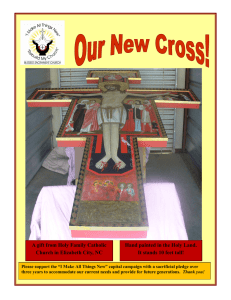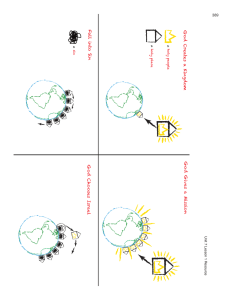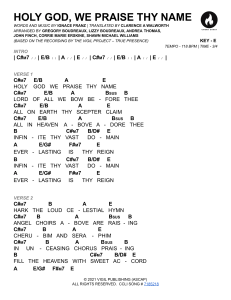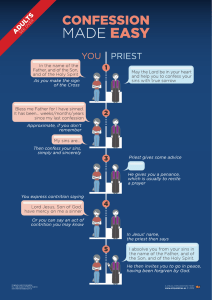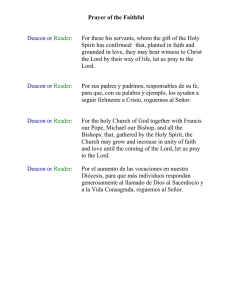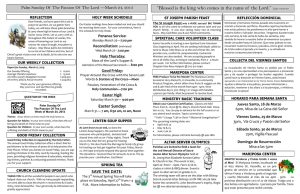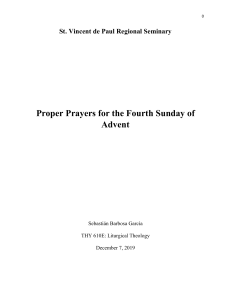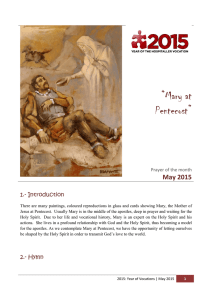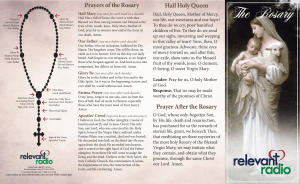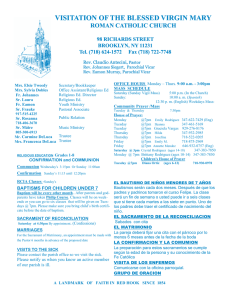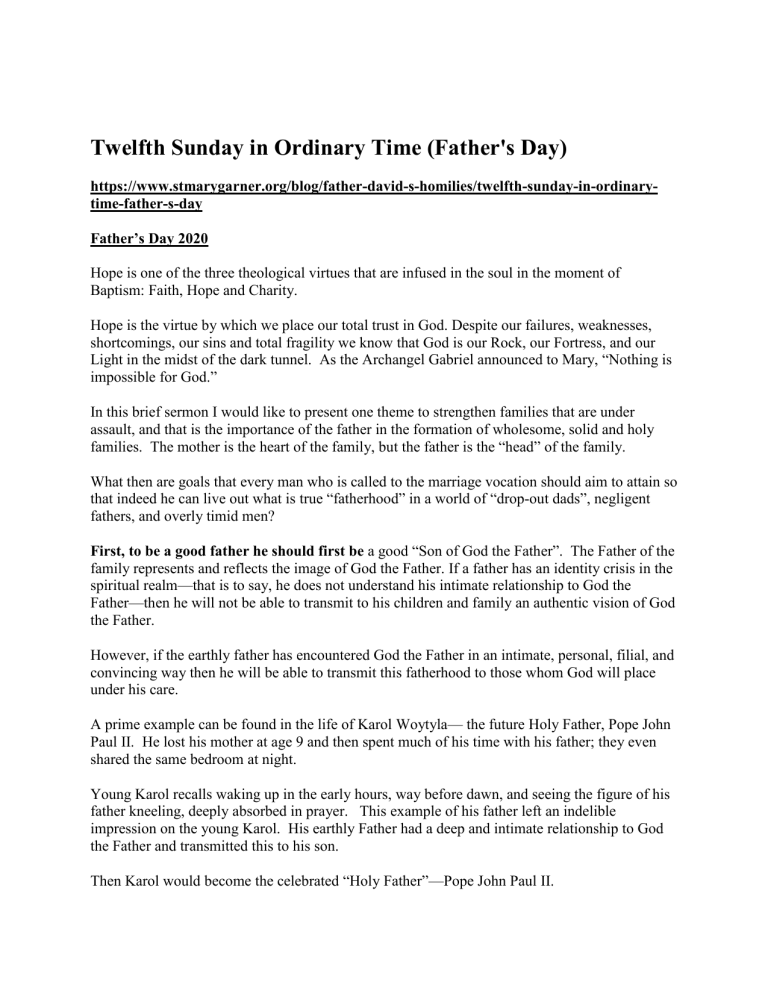
Twelfth Sunday in Ordinary Time (Father's Day) https://www.stmarygarner.org/blog/father-david-s-homilies/twelfth-sunday-in-ordinarytime-father-s-day Father’s Day 2020 Hope is one of the three theological virtues that are infused in the soul in the moment of Baptism: Faith, Hope and Charity. Hope is the virtue by which we place our total trust in God. Despite our failures, weaknesses, shortcomings, our sins and total fragility we know that God is our Rock, our Fortress, and our Light in the midst of the dark tunnel. As the Archangel Gabriel announced to Mary, “Nothing is impossible for God.” In this brief sermon I would like to present one theme to strengthen families that are under assault, and that is the importance of the father in the formation of wholesome, solid and holy families. The mother is the heart of the family, but the father is the “head” of the family. What then are goals that every man who is called to the marriage vocation should aim to attain so that indeed he can live out what is true “fatherhood” in a world of “drop-out dads”, negligent fathers, and overly timid men? First, to be a good father he should first be a good “Son of God the Father”. The Father of the family represents and reflects the image of God the Father. If a father has an identity crisis in the spiritual realm—that is to say, he does not understand his intimate relationship to God the Father—then he will not be able to transmit to his children and family an authentic vision of God the Father. However, if the earthly father has encountered God the Father in an intimate, personal, filial, and convincing way then he will be able to transmit this fatherhood to those whom God will place under his care. A prime example can be found in the life of Karol Woytyla— the future Holy Father, Pope John Paul II. He lost his mother at age 9 and then spent much of his time with his father; they even shared the same bedroom at night. Young Karol recalls waking up in the early hours, way before dawn, and seeing the figure of his father kneeling, deeply absorbed in prayer. This example of his father left an indelible impression on the young Karol. His earthly Father had a deep and intimate relationship to God the Father and transmitted this to his son. Then Karol would become the celebrated “Holy Father”—Pope John Paul II. Second, after placing primary emphasis on his relationship with God the Father, a true father should love his wife. The love and friendship that he has with his wife should be indispensable. This love should not stagnate, or worse yet, fizzle out. On the contrary this human love blessed supernaturally by the sacrament of Holy Matrimony should blossom, grow, and flourish until the moment of death. All too many marriages lose their vibrancy; the love grows cold to the point that both live in the same house as if they were strangers to each other. Obviously, the children will suffer the consequences! How can spouses maintain the flame enkindled and burning bright? As in any activity, sport, or profession, the relationship between spouses demands work, and hard work—blood, sweat and tears. First of all, both should cultivate an ever deeper relationship with God. How? Prayer (both individual and as a family, calling to mind the words of the Rosary priest Father Patrick Peyton, “The family that prays together stays together”); the Sacramental life (frequent confession and Holy Communion); devotion to Mary manifested by the daily recitation of the Holy Rosary— these practices are part and parcel of growing in a mutual relationship with God. This, of course, will foster unity between themselves as husband and wife. Other activities should not be excluded such as a regular retreat for married couples, as well as cultivating good friendships among other good Catholic couples! Third, the father should love his children and see them as a precious treasure that God has given to him with the primary purpose of bringing these little ones to their ultimate destiny which is heaven. A child is a gift given to father and mother but with the primary purpose of the parents being ladders by which the children can climb to heaven. An authentic father first should provide for the spiritual need of the child. He should teach his child to pray as soon as possible. Little children are like sponges. The nature of a sponge is to absorb; it can absorb dirty water or clean water. Likewise, a child can absorb the dirt of the modern world or, through the help of a good father, absorb that which is pure, noble and uplifting. The father should be the teacher to the child especially in prayer. He should be always mindful of the immortal saying of Father Patrick Peyton: “The family that prays together stays together.” With respect to the art of prayer, the father should exercise three different aspects of prayer: 1) He should be a man of prayer and not be afraid to manifest it publicly. There is a saying that praises prayer as such: “The man is greatest when he is found on his knees!” Why? Because he recognizes that true greatness comes from the Father of all good gifts, God Himself. 2) He should pray with the family—the blessing of the meal, the family Rosary and the active participation in holy Mass which is of course the greatest of all prayers. 3) Finally, a true father should be like Moses who elevated his arms so that the Jews could win the battle against their enemies. A father should pray frequently and fervently for his family for their protection from all evils— physical, moral, spiritual—and for his family’s sanctification and salvation. An authentic Catholic father should have his eyes fixed on heaven at all times and stay aware of the world and the dangers that menace the flock (his wife and children) entrusted to him. The greatest desire of the father for his family should be the salvation of their immortal souls. Jesus said, “What would it profit a man if he gain the whole world and lose his soul in the process? What can we offer in exchange for our immortal soul?” Until we have restored the essential role of the father in the family to his proper place the world will suffer intensely. A man who is called to the vocation of marriage assumes an enormously important responsibility. The end of the vocation is holiness of life and the heavenly reward. However, this man (this father) must strive daily to cultivate a deeper relationship to God. His wife must be cherished as his greatest gift on earth. Then, as God sends children, they should be treasured as priceless gems. The father must receive them willingly from the hands of the Father, the Creator. They should be formed by the father emotionally, intellectually, morally, but especially spiritually. Indeed, the father should do all in his power to instill in them a deeprooted Fear of the Lord, but even more, a tender and loving trust and love for our Heavenly Father. Let us turn to the best of earthly fathers, the good Saint Joseph, and beg for his powerful intercession. St. Joseph, most holy treasure of the domestic life, patron of families, patron of fathers, pray for us! +
